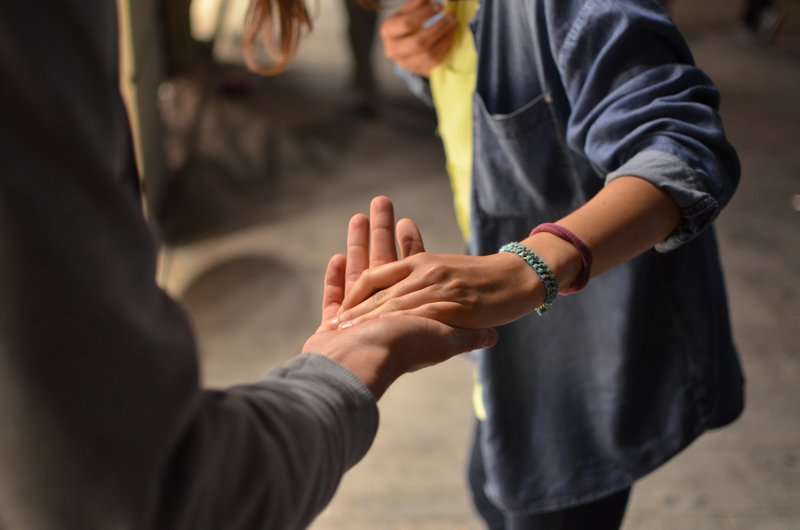Explaining peer support
Our Schools Training Manager outlines what we mean by peer support and the forms it can take across education settings.

In this blog, Monisha Jefcut, our Schools Division Training Manager, explains what we mean by peer support and the forms in can take in school settings. She then shares what it means to her to do the job she loves.
A bit about me
My name is Monisha. I trained as a teacher and worked in primary schools across the south east of England, where I became a senior leader managing behaviour and safeguarding. I went on to develop an interest in mental health and was concerned about the impact it was having on many in my school community. I wanted to make a difference to these families and staff. This led me to becoming a trainer in mental health, joining Anna Freud 6 years ago.
In my current role I develop and deliver a very wide range of mental health training to school staff and clinicians including leading and delivering Peer Support training for schools staff.
Peer support explained
Peer support for mental wellbeing refers to a range of peer-led programmes and approaches to support children and young people. This includes peer tutoring, coaching, listening, mentoring, mediation and counselling, befriending and buddying. It is a form of preventative support and early intervention that aims to address mild mental health needs.
Programmes usually have three key features:
children and young people helping and supporting each other
support being offered in a planned and structured way
supporters engaged who are trained and supervised to carry out their role safely and effectively.
Peer support is widely used across education settings. It can take different forms and be delivered in various ways. Some examples you may know about include:
One-on-one mentoring: mentors and mentees have regular meetings during school or college hours, after school or college, or in a community setting.
One-off or drop-in mentoring: peer mentors take on roles such as playground or corridor champions, are available for drop-in clubs, or act as mediators to resolve peer disputes.
Peer mentor-facilitated wellbeing sessions: peer mentors help develop and facilitate training sessions on topics such as bullying or building confidence.
Community-based programmes: peer support within community organisation settings.
Online support: peer support through websites and apps for more immediate and accessible support.
Impacts of peer support
I have seen how powerful peer support can be. It can be an effective way of supporting and building children and young people’s mental health and wellbeing as part of a whole school or college approach to mental health. It supports both the mentee and mentor. For the mentee it provides an opportunity to share their experience and be listened to, while mentors develop skills including how to listen, be curious and mediate.

Why I love my job
I like that in my role no two days are the same and I love connecting and training some incredible people.
I often co-deliver training with colleagues from the Schools Engagement team, who come from a range of backgrounds, including teachers, senior leaders, clinicians and social work which I enjoy too. Training ranges from two hours to a full day and can be delivered in-person or online.
I really enjoy both formats. They offer a real opportunity to connect and engage with participants, encourage in-depth thinking, challenge and reflection. Plus, there are great opportunities for delegates to network.
Surprises and joy along the way
It sometimes surprises me that staff, who are the biggest asset in schools and may have worked in education for many years, have not had the training opportunities they need to best support their student’s mental health. Sadly, due to pressure on school budgets not all schools can afford to commission or attend this invaluable training.
But making a difference, however small, is what keeps me motivated. Knowing that something I have said can change an action or an outcome for a child, young person or a member of staff.
It’s important in a role like mine to remain curious and open to exploring creative ways of delivering training. At Anna Freud we are always trying to improve the training experience, we listen to feedback and use creative technology to enhance participation.
Do reach out to us for further guidance and support. Developing and running evidence-based in-person and online training for education staff is core to our efforts to build mentally healthy schools and colleges. Our training courses are varied and flexible to suit the bespoke needs of staff across primary schools, secondary schools, alternative provision settings and further education colleges.
Find out more about upcoming courses.
About Youth Mental Health Day
Youth Mental Health Day is celebrated on 19 September. It is coordinated by Stem4, a digital mental health charity that offers free help to children and young people via evidence- based apps and schools programmes.
This year’s theme is ‘Share Support’. It aims to encourage young people and those around them to connect, share, and access clinically-informed mental health resources, with an emphasis on peer support.